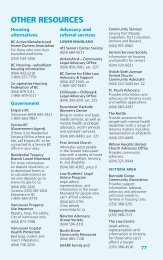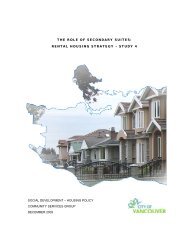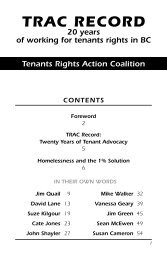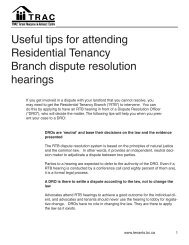Young v. Saanich Police Department, 2003 BCSC 926 (CanLII).
Young v. Saanich Police Department, 2003 BCSC 926 (CanLII).
Young v. Saanich Police Department, 2003 BCSC 926 (CanLII).
You also want an ePaper? Increase the reach of your titles
YUMPU automatically turns print PDFs into web optimized ePapers that Google loves.
<strong>Young</strong> v. <strong>Saanich</strong> <strong>Police</strong> <strong>Department</strong>, et al Page 67<br />
on a role comparable to the role of this court under the JRPA.<br />
I need only apply a standard of correctness to the review<br />
decision. See Cameron v. Sparks, [1997] B.C.J. No. 1570<br />
(S.C.); Gallupe v. Birch, [1998] B.C.J. No. 1023 (S.C.).<br />
[139] In Fulber, Smith J. also addressed the question of<br />
procedural fairness at an arbitration hearing. She concluded<br />
that the parties are entitled to a high standard of procedural<br />
<strong>2003</strong> <strong>BCSC</strong> <strong>926</strong> (<strong>CanLII</strong>)<br />
fairness. Smith J. said this, at paras. 26 and 30:<br />
26 ... In Baker, L'Heureux Dubé J. said (at<br />
pp. 837-841) that the following principles are<br />
relevant to the determination of the content of the<br />
duty of procedural fairness in a given case: (1)<br />
the nature of the decision being made and the<br />
process followed in making it, in particular the<br />
closeness of the process to a judicial process; (2)<br />
the nature of the statutory scheme and the role of<br />
the particular decision within that scheme, in<br />
particular whether there is an internal appeal<br />
procedure; (3) the importance of the decision to the<br />
persons affected, which is identified as a<br />
particularly significant factor; (4) the legitimate<br />
expectations of the person challenging the decision<br />
as to the procedures which will be followed; and (5)<br />
whether the statute leaves the decision-maker the<br />
ability to choose its own procedures and whether the<br />
agency has expertise in determining what procedures<br />
are appropriate in the circumstances.<br />
...<br />
30 Considering each of the factors specified in<br />
Baker, I first note that arbitrators under the Act<br />
have the power to determine their own procedure<br />
(s. 55) and that they may have expertise in making<br />
that determination. This factor points to nonintervention.<br />
However, the other factors<br />
highlighted in Baker point to the necessity for a<br />
high standard of procedural fairness. The











